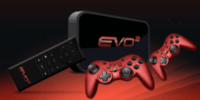EVO Smart Console
EVO Smart Console (originally called Evo: Phase One) is a media PC and video game console marketed in the seventh generation era, and produced by Envizions. The beta, called EVO: Phase One, was released on October 20, 2006, and the final product was released on November 20, 2008.
| Manufacturer | Envizions |
|---|---|
| Type | Entertainment PC |
| Release date | October 20, 2006 (beta) November 20, 2008 (final) |
| Discontinued | 2010 |
| Units sold | 55 [1] |
| Media | DVD, CD |
| CPU | 2.9 GHz AMD Athlon (core) |
| Memory | 2 GB @ 800 MHz |
| Storage | 120 GB hard disk |
| Connectivity | Ethernet 2 × USB 2.0 |
| Backward compatibility | Linux |
| Successor | EVO 2 |
The system uses Linux software, which is built using the Fedora operating system. The system came bundled with three games: SuperTux, Kobo Deluxe, and Kid Destiny. The console also features high definition (HD), Internet access, and allows running Windows games. It also has a built-in 120 GB hard drive and 2 GB RAM.
Final version
The final name of the system was EVO Smart Console, and was released to developers on November 20, 2008 and it cost $250. The latest version had Amiga-based games, an Akimbo-based video on demand service. It also had a larger, 250 GB hard drive, 1080p resolution, and its own Fedora-based Linux operating system, Mirrors Evolution. There are open source codes for developers to make Linux games.
Specifications
|
|
Successors
EVO 2

The EVO 2 is a cancelled game console project first mentioned on an Envizions press release on January 9, 2011 under the name GameBox,[2] it was unveiled on May 25, 2011, with specs, images, and a new name.[3] The sources stated it was supposed to be released in fall 2011. Their website had previously stated that the console would ship in 2012.
- Specifications
- CPU: 1 GHz ARM Cortex-A8 core, Samsung S5PV210. Frequency up to 1.2 GHz,[4] 512MB memory,[4] built-in 2G memory space.
- GPU: Nvidia Tegra
- 512 MB Internal flash memory.[4][5]
- Expandable via SD/SDHC memory cards.
- SD memory card slot (supports SDHC cards)
- 5 USB 2.0 ports
- "AV Multi Out" port, supporting composite video, S-Video (NTSC consoles only)
- HDMI out port, supporting six-channel PCM linear output through HDMI
- 1080p, 1080i, 720p, 480p, or 480i, standard 4:3 and 16:9 anamorphic widescreen.
On November 28, 2012, Envizions CEO Derrick Samuels announced a new Android console, Oton, from his new startup called 'EnGeniux', effectively ending EVO 2's development.
EVO 2 DX
As of 2012, Envizions said it was developing the EVO 2 DX, a gaming PC running both Windows and Android operating systems. It was rumored to have the ability to play Android games using motion gesturing, and have a version which would play Blu-ray Discs.[6][7]
- Specifications
- CPU: An undisclosed "quad-core Opteron & Phenom" CPU
- GPU: Integrated ATI Radeon HD 4200 (DirectX 10.1)
- Chipset: AMD 785G chipset + SB750 chipset
- VGA, DVI-D, HDMI 1.3 outputs
- 4 x SATA II 3Gbit/s AMD RAIDXpert RAID 0,1,5,10
- Integrated ALC662 6-CH HD audio
- Realtek PCI-Express gigabit Ethernet
- 1 x 32-bit PCI, 1 x mini-PCI Express, 2 x eSATA
As of the cancellation of the EVO 2, it is unknown what the situation with the EVO 2 DX is.
References
- "Crowdfunding and the Mysterious Oton Console". Tap-Repeatedly. Retrieved 2012-12-30.
- Jason Rider. "An interview with Envizions founder Derrick Samuels". Thunderbolt. Retrieved 10 January 2012.
- Donald Melanson. "EVO 2 console promises to bring Android gaming to your TV". Joystiq. Retrieved 26 May 2011.
- Rosenberg, Adam. "EVO 2 console will bring Android gaming to your TV". Digital Trends. Retrieved 12 September 2016.
- Piejko, Pawel. "EVO 2 gaming console to bring Android games to TV". Gizmag. Retrieved 12 September 2016.
- "EVO 2 DX". Envizionsinc.com. Archived from the original on 2012-12-28. Retrieved 2012-11-05.
- "Envizions". Envizionsinc.com. Archived from the original on 2012-12-28. Retrieved 2013-02-13.